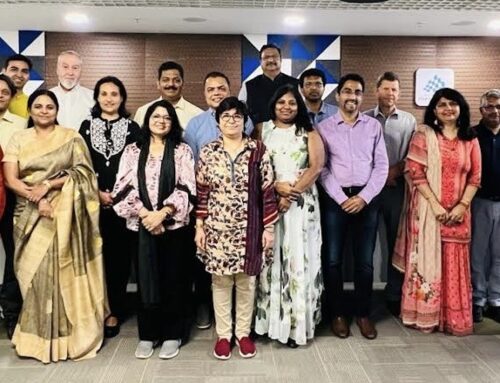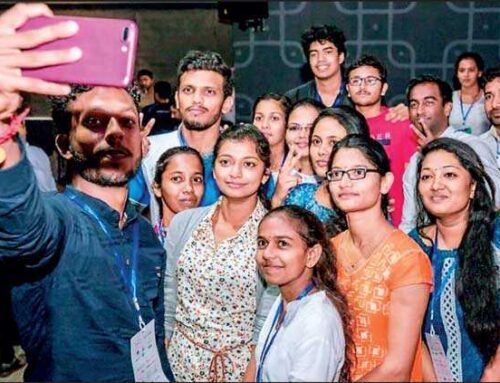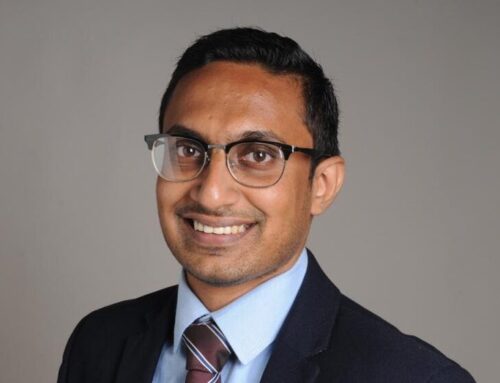John Hoffmire: When you were a fellow of the Chevening Research Science and Innovation Leadership Programme (CRISP) at Oxford a few years ago, we spent a lot of time talking about entrepreneurship. You’ve taken those concepts in an important direction as an intrapreneur – behaving like an entrepreneur while working within a large organization. Please tell me more about that.
Michael: Being a part of Mitsubishi Corporation (MC) allows me to explore opportunities that can make a significant difference to Sri Lanka. This could range from power sector solutions that could bring down the power generation cost, thereby making it attractive for investment or working on socially responsible projects that can improve the livelihood of struggling communities. MC itself is currently ranked 42 on the Global Fortune 500, with over 1,700 group companies in 90 countries. This provides access to a wide range of products and services that can be used to support Sri Lanka. MC has been present in the country for over 50 years. Our current focus areas are infrastructure, trading and investment. Sri Lanka is going through a challenging period. MC’s main focus is to provide sustainable solutions that can make a difference. Annually, MC finds CSR projects that can make a difference through its International Contributions Programme. This has three themes – Realizing an Inclusive Society, Empowering the Next Generation and Conserving the Environment.
John: Will you give me an example of the kind of corporate initiative that your company supports that fits with what you are talking about?
Michael: We are currently running two projects under our International Contributions Programme. On the theme of – ‘Empowering the Next Generation’ we have developed the Business Competency Advancement (BCA) programme for the University of Colombo – Faculty of Management. This is framed to provide undergrad students with practical business skills – what they might have had to learn after entering the working world. Topics range from negotiation skills, debating, presentations, hate speech, fake news, cyber bullying, reading body language and building trust (among others). The sessions are delivered by industry professionals and senior managers of leading organisations in the country. Additionally, we also have a scholarship programme for students with challenging circumstances – to lessen the burden of carrying out their course at the University.
The second project is conducted on the theme of ‘Conserving the Environment’. The focus is – conservation and restoration of mangroves with livelihood development. Since 2019, Mitsubishi Corp joined forces with SLYCAN Trust and Marine Environment Protection Authority (MEPA) for this initiative. Ober 20 acres of land with mangroves have been restored and conserved, including growth of new plants. As you know, Sri Lanka is an island nation and is highly vulnerable to the adverse impacts of climate change, sea-level rise, ocean acidification, floods and storm surges – that threaten its large coastal belt and surrounding waters. We believe our efforts will amount to making a difference in such circumstances. This programme has allowed us to organize a number of stakeholder workshops, including a national workshop on the topic of ‘Community-Based Coastal and Marine Ecosystem Restoration and Addressing Climate Change Impacts in Sri Lanka’. This workshop set out to identify best practices for marine and coastal ecosystem restoration, livelihood development, addressing climate change impacts, waste management and legal enforcement. Sri Lanka’s climate commitments under the Paris Agreement is an important factor that we consider when taking on such projects.
The International Day for Conservation of Mangrove Ecosystems is celebrated every year on 26 July. It is a unique opportunity to raise awareness on the importance of mangroves as a special ecosystem, to promote their sustainable management, conservation and use. We organized an event that gathered different stakeholders, giving them a chance to play a part in protecting a portion of the 19,500 hectares of mangroves around the island. This event supported the ‘World Mangrove Day’ in Sri Lanka.
Sri Lanka has many varieties of mangroves and they are both noteworthy and vulnerable. Unplanned clearing and reclamation for industrial and urban development purposes, tourist resorts, roads and settlements, aquaculture ponds, and the development of fishing ports threaten most of these species. Furthermore, increased levels of inorganic ions from agriculture and organic compounds as well as untreated sewage and solid waste disposal have accelerated nutrient pollution in mangrove ecosystems. Sri Lanka has many positive policies aimed at conserving and restoring its mangroves and now it is time to ensure that these plans are efficiently supported.
John: You have been quite active as a CRISP alum and are the head of CRISP Social Ventures in Sri Lanka. Tell me more about what being a part of the Chevening programme at Oxford has meant to you.
Michael: The Chevening Programme at St Cross College (University of Oxford) was a life changing experience for me. I was able to become a better leader and also develop personally in a number of areas. If I could sum it up in three words – it is experience, exposure and friendship.
The experience of living and learning in Oxford, its diverse culture, multiple nationalities and variety of topics covered, provided me a much broader perspective of a number of subjects, which I may have never covered if not for this Fellowship. I still remember the class on pandemics and vaccinations, which was a new area for me and how true it rang just two years after the programme with the spread of COVID-19.
I had the added advantage of having my best friend from high school, Gehan Gunatilleke (coincidentally) also studying at the same college in Oxford – reading for his PhD in Law. It made my experience even more memorable – as I had a permanent tour guide.
The CRISP Programme exposed me to different subject areas – my background was in marketing and projects. Whether it was thermodynamics, engineering, history, politics, art, sustainability, technology, social ventures, startups and incubators or even photography – the areas covered allowed me to walk out with a different world view. The mentoring programme to me made the biggest difference – I was able to identify areas for improvement while being given a bag of tools to tackle many difficult situations. On the other hand, Oxford is an eco-system in-itself for learning – with different talks / lectures at different colleges by thought leaders and even film directors. It’s not every day you get to talk to Sir Sam Mendes and ask him about directing James Bond over a glass of wine.
My cohort, you, Richard, and the great teachers of Oxford, their families – are now life-long friends. It’s been three years since CRISP ended. I was lucky to visit India in 2019 – as we organized an event called CRISP IGNITE – which brought together CRISP alumni from over 5 different batches.
John: Thank you. Richard Briant and I look forward to coming back to Sri Lanka and seeing you. We always enjoy our visits with you and others CRISP alums.
Michael: I look forward to seeing you’ll as well and please stay safe!
Read the entire interview here at The Center on Business and Poverty
Michael Jayawardana is the Assistant General Manager at Mitsubishi Corporation, Sri Lanka, and an alum of the Chevening Research Science and Innovation Leadership Programme (CRISP) 2018.
Interviewer: Dr. John Hoffmire is the Chairman of the Center on Business and Poverty, and Research Associate at the Oxford Centre for Mutual and Co-owned Business
Video: Michael Jayawardana, Mitsubishi Sri Lanka, at #WorldMangroveDay





